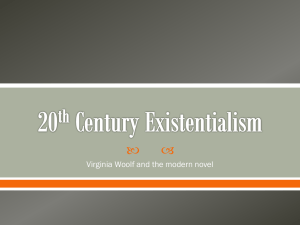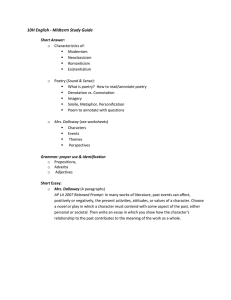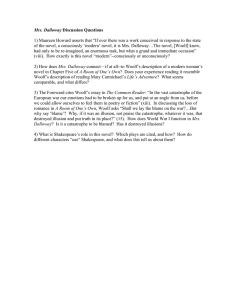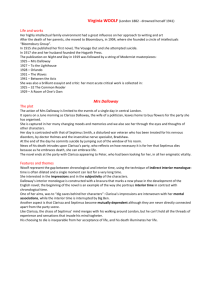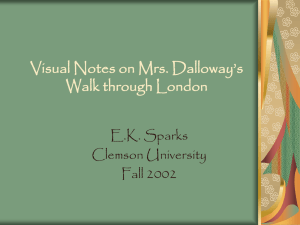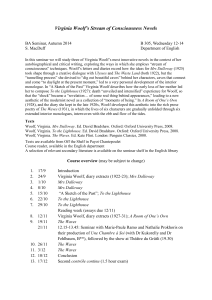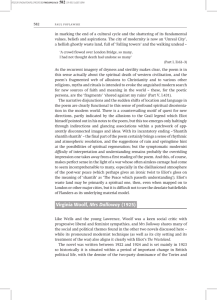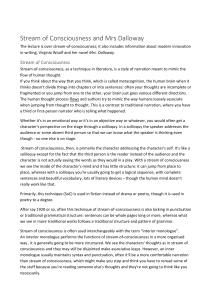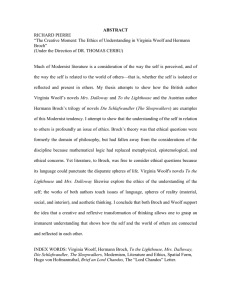Krause AP Literature Spring 2015 Mrs. Dalloway Unit Overview
advertisement
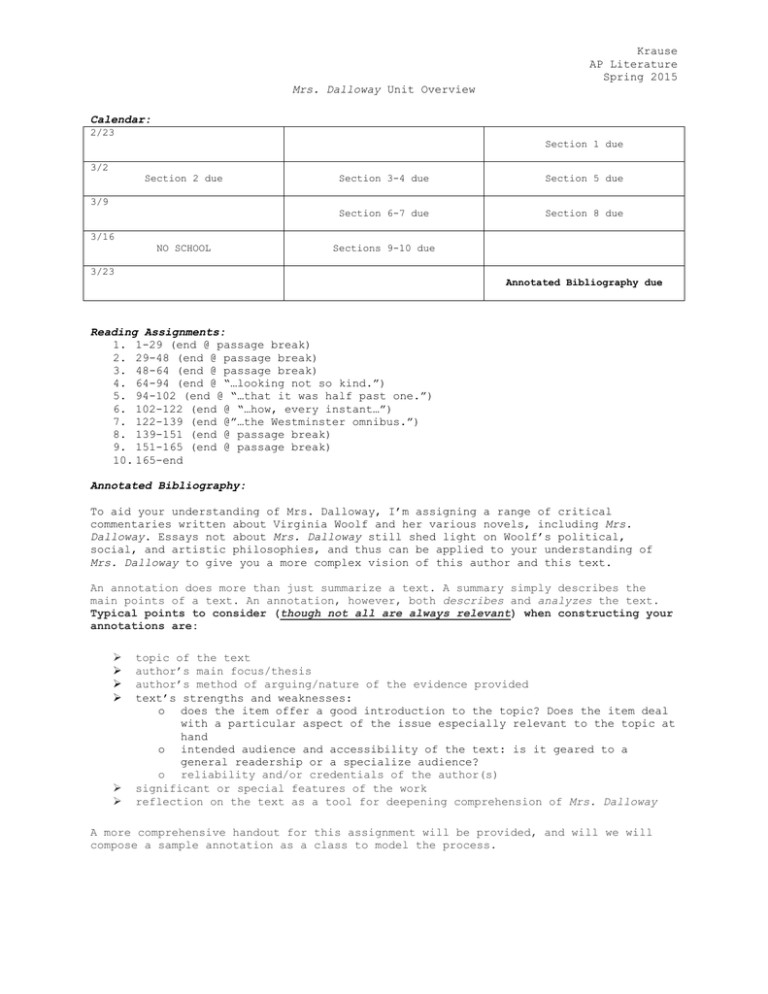
Krause AP Literature Spring 2015 Mrs. Dalloway Unit Overview Calendar: 2/23 Section 1 due 3/2 Section 2 due Section 3-4 due Section 5 due Section 6-7 due Section 8 due 3/9 3/16 NO SCHOOL Sections 9-10 due 3/23 Annotated Bibliography due Reading Assignments: 1. 1-29 (end @ passage break) 2. 29-48 (end @ passage break) 3. 48-64 (end @ passage break) 4. 64-94 (end @ “…looking not so kind.”) 5. 94-102 (end @ “…that it was half past one.”) 6. 102-122 (end @ “…how, every instant…”) 7. 122-139 (end @”…the Westminster omnibus.”) 8. 139-151 (end @ passage break) 9. 151-165 (end @ passage break) 10. 165-end Annotated Bibliography: To aid your understanding of Mrs. Dalloway, I’m assigning a range of critical commentaries written about Virginia Woolf and her various novels, including Mrs. Dalloway. Essays not about Mrs. Dalloway still shed light on Woolf’s political, social, and artistic philosophies, and thus can be applied to your understanding of Mrs. Dalloway to give you a more complex vision of this author and this text. An annotation does more than just summarize a text. A summary simply describes the main points of a text. An annotation, however, both describes and analyzes the text. Typical points to consider (though not all are always relevant) when constructing your annotations are: topic of the text author’s main focus/thesis author’s method of arguing/nature of the evidence provided text’s strengths and weaknesses: o does the item offer a good introduction to the topic? Does the item deal with a particular aspect of the issue especially relevant to the topic at hand o intended audience and accessibility of the text: is it geared to a general readership or a specialize audience? o reliability and/or credentials of the author(s) significant or special features of the work reflection on the text as a tool for deepening comprehension of Mrs. Dalloway A more comprehensive handout for this assignment will be provided, and will we will compose a sample annotation as a class to model the process. Krause AP Literature Spring 2015 Mrs. Dalloway Unit Overview Reading Logs: Maintain a reading log to record your impressions of, responses to, reflections on, and questions regarding Mrs. Dalloway. Complete an entry for each reading assignment. Log entries are due in class on the days each reading assignment is due to have been read. Please have all complete entries with you every class period. Visual artistic responses are not an option for this assignment, though if you want to compose such a representation as an additional means of clarifying your comprehension and insight, please feel free to do so. As complex, independent, considerate readers who can approach innovative, challenging, dynamic literature and show such involvement in writing, how you choose to respond to the text is up to you. That being said, if you need a prompt for guidance, consider the list of reading prompts provided. How long should the entries be? Well, that’s up to you. You are only limited by what you choose to not do. Shallow entries will result in shallow grades. Please be wary of straying into being dismissive of the text. Please provide a heading for each new entry, including the date of completion and a title / description of the entry (or Reading Assignment #). Have all entries completed and with you when you show up for class. “I forgot to print it” means that you do not have it. Prompts to consider for written response to each reading: Referring to a specific character in Mrs. Dalloway, show how interior monologue functions as a narrative and expository device. While Virginia Woolf was writing this novel, she referred to it as The Hours. She changed the title, but what evidence is there of her concern with time? The charge has been frequently made that “nothing happens” in Virginia Woolf’s novels. How would you answer this? What facets of the English social system does Virginia Woolf criticize? Why does Peter Walsh object to Hugh Whitbread? Describe Miss Kilman in terms of her religious feelings. How, and through what characters, does Virginia Woolf weave the theme of possessiveness and possessive love? In what way are Peter Walsh and Sally Seton similar? Peter and Clarissa? Describe and reflect upon instances in which a “sane” character thinks or utters a phrase that is amplified in Septimus Smith’s madness. From the brief scene Virginia Woolf presents, describe Clarissa and Richard’s marriage. What does Clarissa Dalloway’s value? Consider the varied connotations of the motif of trees and flowers. Additionally, I will assign a formal reflection assignment regarding these logs.
